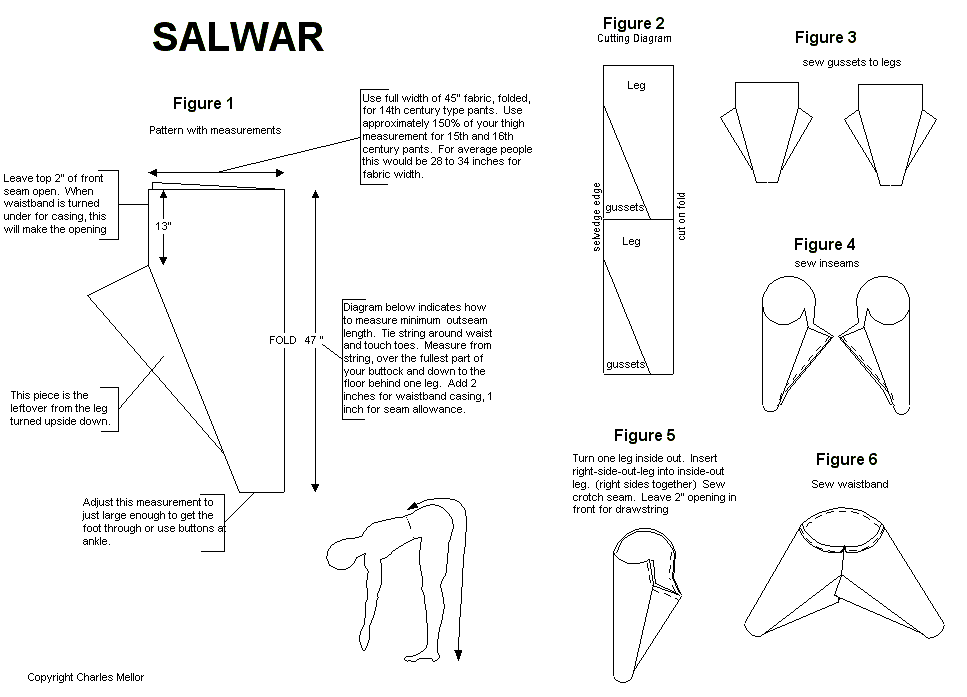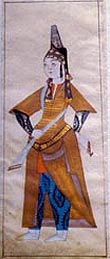Difference between revisions of "Shalwar"
| Line 1: | Line 1: | ||
Shalwar or chalwar are known by many names. Harem pants, pantaloons, and belly pants are among the names I've heard. Basically, it's a pair of very loose and baggy (and comfy!) pants with drawstring or elastic at the waistband and ankles. | Shalwar or chalwar are known by many names. Harem pants, pantaloons, and belly pants are among the names I've heard. Basically, it's a pair of very loose and baggy (and comfy!) pants with drawstring or elastic at the waistband and ankles. | ||
| − | These are narrow at the ankles and widen as they go up the thigh. Quite a few have survived from the late 16th and 17th centuries. Shalvar are often made of the same kinds of fabrics as the entari, but they should NOT match. | + | These are narrow at the ankles and widen as they go up the thigh. Quite a few have survived from the late 16th and 17th centuries. Shalvar are often made of the same kinds of fabrics as the entari, but they should NOT match." |
| − | [[Image:Salwar.gif|left|thumb|Pattern for Salwar]] | + | [[Image:Salwar.gif|left|thumb|Pattern for Salwar, by Rashid and used here without permission or credit]] |
| − | In some of the accompanying pictures you can see that some shalvar are made much longer than the actual woman's leg, and of very soft fabric that pools around the leg.[[Image:LadyinGold.jpg.jpeg|frame|Painting of a lady wearing [[Shalwar]] under her [[Entari]] note how the patterns of each major garment clash.]] | + | In some of the accompanying pictures you can see that some shalvar are made much longer than the actual woman's leg, and of very soft fabric that pools around the leg."[[Image:LadyinGold.jpg.jpeg|frame|Painting of a lady wearing [[Shalwar]] under her [[Entari]] note how the patterns of each major garment clash.]] |
| + | |||
| + | Much of the text above (but most emphatically not the 1st paragraph) is quoted verbatim without permission from Dar Anahita, the website of Urtatim al-Qurtubiyya. This is copyright infringement. Either write your own content, or ask for permission before stealing the research of others. | ||
| + | |||
| + | |||
| + | |||
| + | |||
===Links=== | ===Links=== | ||
| − | *[http://www.geocities.com/tala571/shalwar.html How | + | *[http://www.geocities.com/tala571/shalwar.html How to make shalvar, from Tala's Middle Eastern Dance Page - it is not historically accurate] |
| − | *[http://www.geocities.com/kaganate/pants1.html How to] | + | *[http://www.geocities.com/kaganate/pants1.html How to make shalvar by Rashid, on the Red Kaganate site] |
[[Category:How To]] [[Category:Garb]] [[Category:Ottoman Garb]] | [[Category:How To]] [[Category:Garb]] [[Category:Ottoman Garb]] | ||
Revision as of 20:53, 22 September 2009
Shalwar or chalwar are known by many names. Harem pants, pantaloons, and belly pants are among the names I've heard. Basically, it's a pair of very loose and baggy (and comfy!) pants with drawstring or elastic at the waistband and ankles.
These are narrow at the ankles and widen as they go up the thigh. Quite a few have survived from the late 16th and 17th centuries. Shalvar are often made of the same kinds of fabrics as the entari, but they should NOT match."
In some of the accompanying pictures you can see that some shalvar are made much longer than the actual woman's leg, and of very soft fabric that pools around the leg."
Much of the text above (but most emphatically not the 1st paragraph) is quoted verbatim without permission from Dar Anahita, the website of Urtatim al-Qurtubiyya. This is copyright infringement. Either write your own content, or ask for permission before stealing the research of others.

